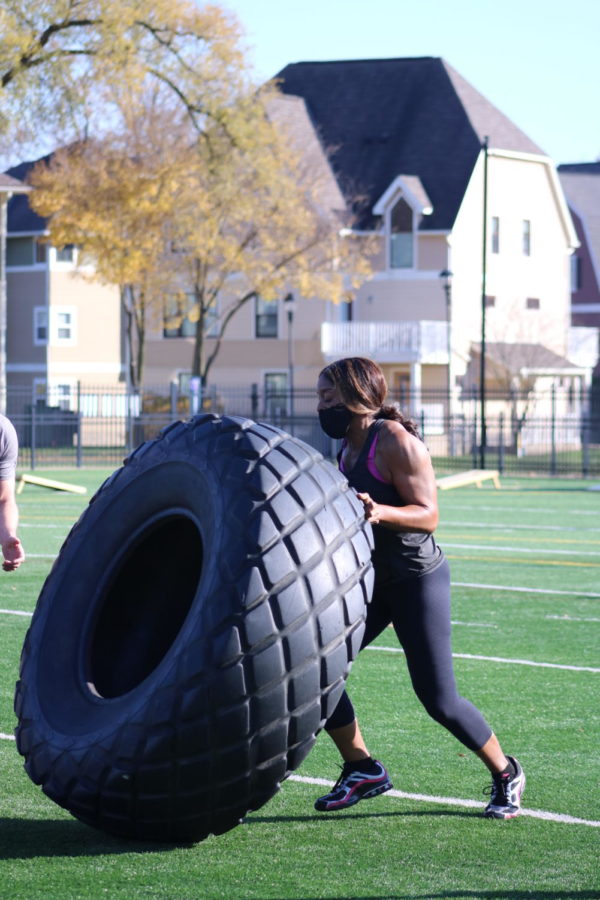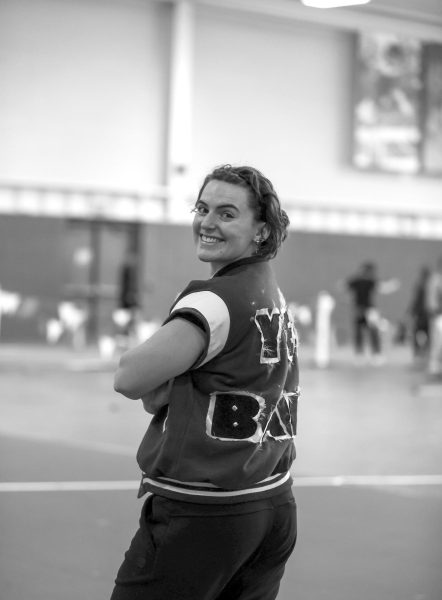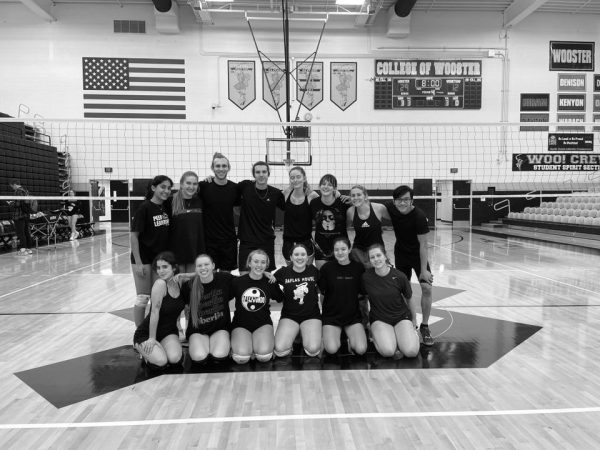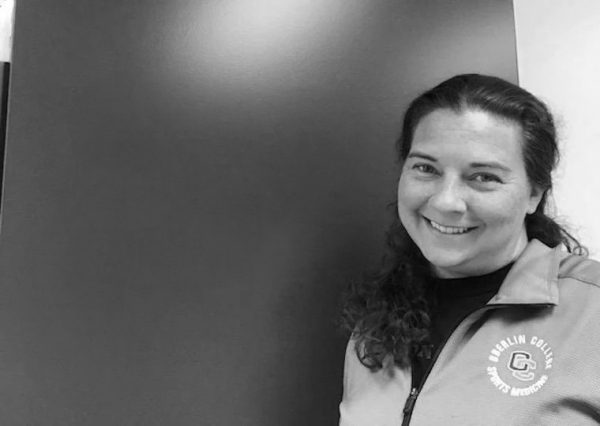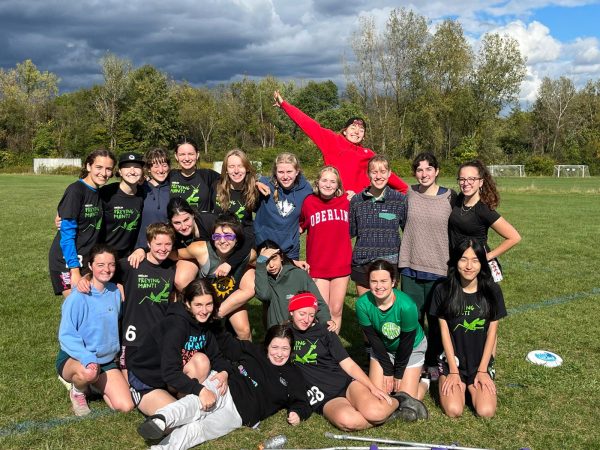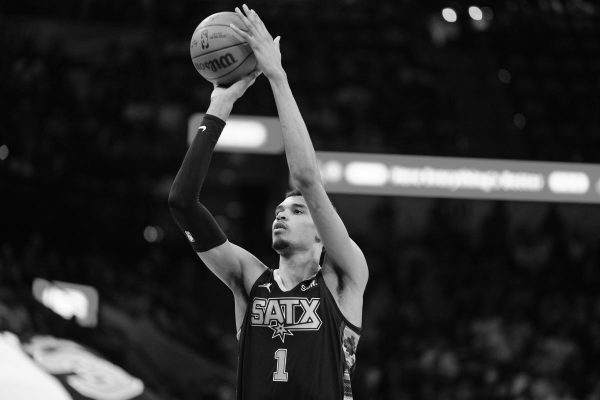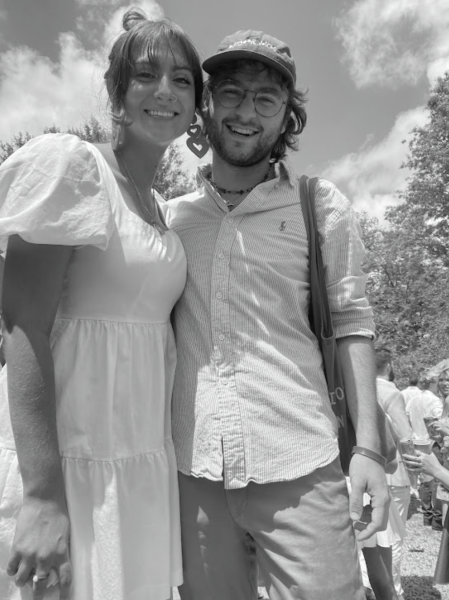In The Locker Room With President Ambar, Instagram’s Newest Fitness Influencer
Oberlin College President Carmen Twillie Ambar flipping a tire.
Every morning at 3:45 a.m. President Carmen Twillie Ambar’s alarm goes off to ensure she can get an intense workout in at the gym before she starts her day as Oberlin College’s 15th president. Over the past four years at the College, she has dedicated herself to fitness. This year, she started the Instagram account @fitprezcta, so she can share what she’s learning about fitness and wellness with others, in hopes that her journey will inspire others to begin their own.
This interview has been edited for length and clarity.
Can you tell us a little bit about your journey with fitness?
I grew up in a family of athletes. My dad and older brother played football. My dad was a coach. My younger brother was a fantastic athlete — he went to Olympic trials as a swimmer — and my mom played basketball. I was a swimmer and was always sort of athletic in that way. That is fitness, but what I do now is a little bit different. That was about performing in the pool, and this is more a whole-body approach. How do I keep my body performing at the level that I want it to? How do I keep my mind where it needs to be? How do I keep my eating habits? So the whole health piece — I honestly don’t think I got there until the last sort of three years.
Do you enjoy working out, or is it just a means to an end?
It’s an actively fun thing for me. I have various workouts that I do, I have times associated with them, and I try to beat my times. That’s a big part of what I do in those workouts. It pulls out all the things that I felt in competition — so that nervousness, that energy rush of, “Oh, okay, we’re getting ready to go,” that sense of pushing yourself beyond where you think you can go because you are trying to make a certain time and you can feel that pressure, and then that sense of accomplishment. It’s been a huge addition to where I am mentally right now.
Could you tell us about your daily routine for waking up and getting to your workout?
My alarm goes off at 3:45 a.m. and, depending on the day, I might give it two snoozes. I normally throw on all my exercise clothes beforehand, because I don’t want to think through that. And I kind of ease into it. If I can get on the treadmill [at my home] by 4:20, I can get in two miles. If I get on after 4:30 or 4:35, I’m probably going to get in one mile. I get to the gym about 4:45.
I work out Monday through Saturday. Over the six workouts, I do two that are cardio, two that are really heavy lifting, and then two of what I call “peak performance” days. And that’s what I call my CrossFit stuff. I leave at about 6:10 and I go home, and at 6:30 it’s time to wake the triplets up. And that’s how the day starts.
Between that intense workout regimen and your position as president, do you ever get a break?
You know, it’s funny. I mean on the outside looking in, I think it must be intense. But now it’s my habit, and the benefits for my mental well-being are just immeasurable. There are not very many times in my life that my mind is totally devoid of thoughts of Oberlin, thoughts of work, thoughts of whatever. I can’t be trying to plan the triplets’ lives while I’m working out.
If you can break your mind away from thinking about all this stuff and give it time to focus on something else, like exerting yourself, then when you come back to [work, your personal life, etc.], I think you’re fresher, clearer, more set in what you think. People think it’s intense, but it’s actually freeing. It’s actually a way of breaking intensity and giving your mind a space to go and be free for a moment.
What made you want to start your fitness Instagram account?
I think it was for a couple of reasons. When I started here at Oberlin and kind of had this physical transformation. I lost 90 pounds. So people just kept saying, “What the heck is going on?” So I got a lot of questions about “What are you doing?” As I started to get more intense and really see the overall benefits of this experience for me, I thought, “Should I just do this by myself? Whatever I’m learning along the way, should that just be for me — or should I try to see if other people might find it has value?”
I was really nervous to start the account, though. Because it’s not about Oberlin [and] with what my job is, I knew that I would be forever connected with it. I would love to be able to separate it from Oberlin, since it’s kind of a personal thing.
I guess the other thing that made me do it was that so many people got interested in the tire flip competition, and I was just trying to find something fun that we can do together. Then other college presidents were tweeting at me about it. And this whole thing about who’s the fittest president started to come up, and then a donor gave $18,000 anonymously because of the 18 tire flips that I did. So it was just kind of cool, and I thought maybe people might be interested in seeing what I do and maybe it might help some people do something for themselves.
Now, I get these messages all the time that are super cool. You know, someone sent me a note, a parent, I think, who is going to create a gym in their backyard. I got a note the other day that said, “I just took my kettlebells out to the street. I’m going to carry them down because of you.” I love to see that, because this is really about everybody else’s own personal efforts to do what they need to do and to make their lives more whole because they’re more physically fit and more mentally fit.
What would you say are your favorite and least favorite exercises?
That’s so hard because there are a lot of exercises that [I dislike], but I think these ones that we don’t want to do are sometimes areas of weakness. So, I would say don’t leave those out because what you don’t realize when you’re young is that you lose that mobility, you lose the ability to do those exercises. And so, even though there are things that I hate doing, I would say don’t leave those out if you can manage to keep them in.
[That said], can I just say I get a thrill out of a deadlift? I don’t know why, but that exercise just makes me happy. I love a good deadlift, and I love heavy deadlifts. I’ve only gotten up 325 pounds for three reps. Not anything crazy, but that feeling of lifting that is awesome.
The thing that I’m most proud of it took me 24 months to do: learning how to do dead hang wide grip pull-ups. The reason why I love a pull-up, particularly for women, is because if you walk in the gym, go to any gym in the country, as a woman, get up there and do 10 dead hang pull ups, you’ll stop the whole gym. That particular exercise is respected by everyone because they know what that takes. And the reason why I’m so proud of that is because 24 months ago, I could not do one pull-up. I think after 12 months I could do more than one. Now I can do 12 dead hang pull-ups. And now I’m putting weights on me.
And because they take so much, I’d probably put toes to bars in there too. I put that up on Instagram a couple of days ago. That’s a powerful one.
I have a really bad knee, so the things that I always want to leave out are things that make me have to move that range of motion.
Do you have any advice for folks who are struggling with body positivity and starting their wellness journey?
One of the critiques I got [about my Instagram page] was from someone who felt that me posting my before and after pictures for my weight loss was having people focus on their own body image in a way that they thought was not helpful.
I think part of the reason why I like to do this is because this isn’t about [physical appearance]. Although there are changes to your body when you work out a lot, it really is about your mental health. It’s not just that I physically look better, although I think I do. It’s really more about the mind space that this creates. So for those people who are [struggling with] body image, I would say that the way to think about exercise and wellness is not so much about image as it is about creating that mind space that allows you to be free from worries and concerns.
My body was not a body that people thought was respected and valued. It’s a real thing, this issue of our bodies and how we feel about ourselves and how society makes us feel about ourselves. But for me, this was in some ways about taking control of that. Not letting that be imposed upon me by other people’s views of me or what I should look like or feel like.
Any other advice for people who are just starting their fitness journey?
I would say, first of all, that it’s so doable, so don’t think that you can’t. The second thing is that you don’t have to start out running five miles. You just start out with something simple and you do that for a while. If you believe that it’s going to be a part of a lifestyle, then you won’t try to rush and solve everything in six months.
We’re all more accountable to other people, so if you can, find someone who can be supportive and hold you accountable. Be careful who you choose to be your accountability partner because they can be not helpful, too.
The final thing I would say is that this is about having fun. It really is. So you have to find something that’s fun. That doesn’t mean it won’t be intense or that you won’t dread it some days. But you should get some enjoyment out of it. My stuff is intense. It’s a little over the top. I get it. But that’s how I have fun. So you find the thing that makes you have fun and then I guarantee you, 20 years from now, you’ll still be doing that fun thing that you enjoy.
Is there anything you can tell us about the rumored Oberlin College Presidential Olympics?
I don’t know whether it’ll happen. [The Athletics department] may be all distracted because they have athletics back in season and they have other things, but the idea is to do something tire flip-like, but have multiple events, and just allow people to go out there and have fun. And what I liked about the tire flip was that it didn’t just bring out the student athletes, although I knew it would, but it brought out other members of the campus. And that was also a nice moment for folks who are not involved in athletics to go out and demonstrate their kind of physical prowess in a space where student-athletes were, too.
It was a difficult enough challenge, but an easy enough challenge that even one successful rotation was worth something. Even the ability to just get it up was worth something. That’s what’s great about physical fitness. You can start where you are, and whatever thing you can do can be celebrated because you did that. Even though there may be somebody else that can do 50 of something, that’s fine. It’s great for them. You can say, “I can do half of one, and that’s great for me.” So we all get a chance to have successes. It’s really just about our own physical wellbeing.


